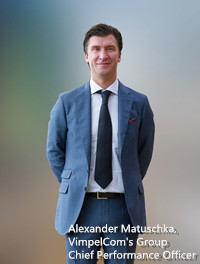VimpelCom: A Digital Company in the Making
 VimpelCom is an international communications and technology company driven by a vision to unlock new opportunities for its customers as they navigate the digital world. Present in some of the world’s most dynamic markets, VimpelCom provides more than 200 million customers with voice, fixed broadband, data, and digital services. Recently, ZTE Technologies interviewed Alexander Matuschka, VimpelCom’s Group Chief Performance Officer. He shared with us his biggest challenge, VimpelCom’s Excelerate Program and top priorities for 2017, and the partnership with ZTE.
VimpelCom is an international communications and technology company driven by a vision to unlock new opportunities for its customers as they navigate the digital world. Present in some of the world’s most dynamic markets, VimpelCom provides more than 200 million customers with voice, fixed broadband, data, and digital services. Recently, ZTE Technologies interviewed Alexander Matuschka, VimpelCom’s Group Chief Performance Officer. He shared with us his biggest challenge, VimpelCom’s Excelerate Program and top priorities for 2017, and the partnership with ZTE.
To transform VimpelCom from a traditional telecom operator to a truly digital company, the biggest difficulty I faced was dealing with 14 independent OpCos and trying to unite them as one organization.
We see many functions being replicated in our OpCos across every function. As we consolidate those functions, we will become a leaner organization benefiting from the international scale that VimpelCom’s geographical footprint brings to bear.
First of all, I’m German and by nature that means I’m rarely satisfied. I’m very proud of what we’ve achieved so far. We have begun by eliminating micro teams and delayering the organization. As a result of all of that effort, we are now more agile than we’ve ever been before. To put that in numbers, since we began the program a year ago, we have reduced headcount by 21 percent.
The other dimension is that we really start to benefit from the group’s scale. 70 percent of our procurement volume is now covered by global contracts rather than local contracts.
Our operating model consists of four elements, of which we have begun work on two. First, we have started setting up global shared service centers, which will bring higher quality transactional processes. Our center in Lviv, Ukraine is already open, while our existing center in Yaroslavl, Russia, which employs nearly 1,000 people, is ramping up to shared service specification. Next month, we will open another center in Islamabad, Pakistan. Second, we are scaling managed service across our entire footprint, consolidating seven countries in one managed service contract and one network operations center.
Customer care is also moving into the right direction as we digitalize more and more processes, and we have set up a regional headquarters to cut down on activities in the countries. Everything is on track and, although we are only 50 percent of the way through, the financial and operational benefits are already showing up.
You know, a year ago, we signed a trusted partner relationship, which is different from typical customer and vendor relationship. Trust is difficult to build and requires that partnerships are honest, truthful, and straightforward. I do believe that, in the last twelve months, we have established this kind of relationship.
If I look at how the relationship between ZTE and us has developed, we are growing together, which is nice to see, and I believe this will be a long journey for our two companies.
Could you tell us about your top priorities in 2017?
For 2017, our priorities are very simple. 2017 will be the second year of the Excelerate Program, which is a very important year as every transformation program should be finished in three years. Otherwise, you will not be successful. The first two years of Excelerate is implementation and execution, and the third year is learning and modification. Another priority is virtualizing our core infrastructure. We are heavily working on that so as to become a more digital company. This is my second priority.
But my most important priority is changing our company culture. We are very dispersed, very local, and we need to build a single, unified culture as we move from telecom operator to digital company. This is where I will concentrate my efforts because I believe we have so many talented people in the company, but they rarely get the chance to be heard. I want to build and encourage a culture where people feel they are able to speak out and share their ideas.
How do you think the partnership between VimpelCom and ZTE will evolve?
We’re on a good track and I believe we can double or triple our business. But I also think ZTE needs to rethink some of its activities. I’m confident that ZTE will follow my recommendations and even outperform them.